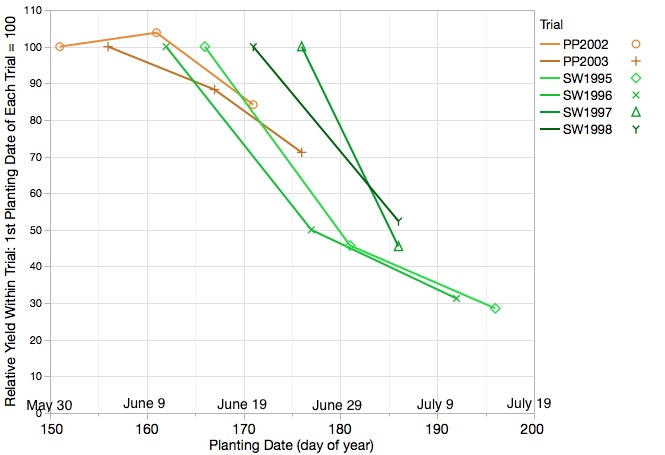The wet spring has likely delayed some planting of pumpkins. What does delayed planting mean for yield? Data and observations from Purdue Ag Centers offer some perspective to supplement other experience.
Figure 1 shows how pumpkin yield was affected by planting date for 6 trials. Each line represents a different trial. The Y-axis shows relative yield within in each trial. Yield of the first planting date for each trial is set to 100. For the two trials at Pinney Purdue (orange lines, PP2002 and PP2003), pumpkins seeded June 20-25 yielded 70%-85% of pumpkins seeded by early June. In the 1995-1996 trials at Southwest Purdue Ag Center (light green lines, SW1995 and SW1996), pumpkins transplanted June 25-30 produced about 50% of those transplanted two weeks earlier (June 10-15). Transplanting two weeks later (July 10-15) produced only 30% of the yield compared to the June 10-15 plantings. In the 1997-1998 trials at Southwest Purdue Ag Center (darker green lines, SW1997 and 1998) transplanting July 5 produced 45%-55% of the yield compared to transplanting June 20-25.
Delayed planting can alter the relative timing of the pumpkin crop and specific insect, disease, or weed issues, causing them to be either more or less of a problem. Regular and methodical scouting will make it easier to spot trouble before it gets out of hand.

Figure 1. Relative yield of pumpkins planted on different dates in 6 trials. PP=Pinney Purdue Ag Center, Wanatah, IN. SW=Southwest Purdue Ag Center, Vincennes, IN. Data for SW from Brust, G.E. 2000. Reflective and black mulch increase yield in pumpkins under virus disease pressure. Horticultural Entomology 93:828-833.